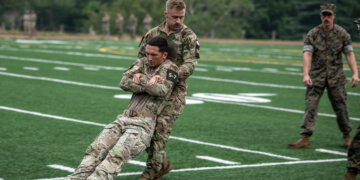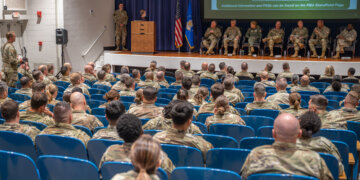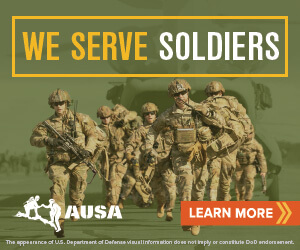As the government shutdown extends into a second month and the prospect of missed paychecks looms, it seems unlikely that National Guardsmen and reservists will be able to return to business-as-usual any time soon.
Retired Maj. Gen. Francis McGinn, president of the National Guard Association of the United States (NGAUS), said that their members had sent nearly 10,000 letters to members of Congress by the end of October.
“There are more co-sponsors on the House bill to pay the troops,” he said. “That’s the only movement we’re seeing.”
When talking to members of the National Guard and reserves, they seem both circumspect and concerned.
“It’s not my first rodeo,” said one senior NCO in the Army Reserve, David, who agreed to speak on condition of anonymity. With 25 years of service under his belt, he experienced his first shutdown while deployed to Iraq in 2005. “They play chicken with the budget, you get backpay in whatever seemingly random amount they pick over the course of the next training year, and that’s it. You shut your face and you’re thankful for it.”
While the lack of pay won’t break his family’s budget, he is concerned for younger soldiers in his unit who were unable to financially prepare for the shutdown. Many enlisted for the benefits of the GI Bill. With those payments in limbo, their ability to continue their schooling is in peril. In addition, many lower enlisted soldiers depend on SNAP benefits that have now lapsed.
“These kids are born of suffering,” David said. “They’re warriors. Life is not an easy one, but there’s an unspoken agreement of, ‘Hey, you pay me, you feed me, you house me, and I will kill for you, and God forbid, I may die for you.’ But the US government can break their promise.”
Learn more about resources to help navigate the financial impacts of the government shutdown
The shutdown also restricts the ability of the reserves to execute their normal functions. Another senior NCO who recently returned from a deployment struggled to find things for her unit to do during their recent drill weekend.
“My guys, my mechanics, they just want to work,” she said, also speaking anonymously. “But we have zero dollars to spend on oil or filters or fuel. We can’t even drive our vehicles.”
Many vehicles sat unused for the better part of a year during the deployment, so when the shutdown ends, addressing maintenance issues that piled up over time will come with a much larger price tag.
NGAUS is also worried about the tens of thousands of guardsmen who also hold civilian jobs as dual-status technicians and have not been paid since the shutdown began.
“Initially, they were excepting and making them keep coming in, but now there’s so much empathy for the soldiers and the airmen that they are furloughing them,” McGinn said. “Which isn’t a good option either, but it gives them an opportunity to maybe pick up something else until this gets resolved.”
Guardsmen and their families are not sure when they’ll receive their next paycheck. The wife of one staff sergeant in the Mississippi National Guard said that they weren’t given any guidance until nearly a month into the shutdown.
“I had National Guard friends who had no idea that we were going into a government shutdown,” she said. “They had no idea that their spouses were about to miss a check.”
LEARN MORE: App offers information on grocery savings during government shutdown
By the time the adjutant general communicated with the guardsmen about resources, she had lost trust in leadership.
“He needed to have done it when all of this was starting, instead of when his troops and their families were anxious and we didn’t know what to do.”
While she herself struggles with keeping her morale high, her husband hasn’t wavered in his devotion to his career in the National Guard.
“These are people who deploy — they give up time with their families, they go into dangerous situations,” she said. “Yet we have this conundrum of, do you stay and serve your country? Or do you struggle to pay bills, and your family not have enough to eat, just for you to fulfill a mission?”
After 25 years of military service, David fully understands what his job entails.
“We don’t have a choice,” he said. “If my whole element decides we’re not training, we’re not deploying, we’re not doing anything, until you pay us again? That’s mutiny. So they work without pay, work without benefits, their credit goes [down], their bills get stacked up through no fault of their own, and if they don’t work, they go to jail.”
The maintenance NCO is using the shutdown as an opportunity to teach her soldiers a valuable lesson on the realities of military service.
“I told them that you’re going to have periods where it’s just hurry up and wait,” she said. “You have to just understand this is going to be a regular occurrence and make the best of it.”
But David wishes Congress would recognize how detrimental the shutdown will be to the long-term health of the military. “That was a kid that could have been your next first sergeant,” he said. “They’ll never sign another contract. They have better [things] to do with their life then wait around for [Congress] to come to an agreement.”
Read comments






































